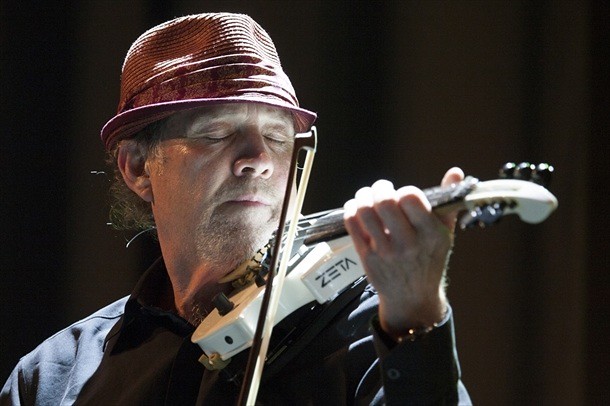HIT CHANNEL EXCLUSIVE INTERVIEW: March 2020. We had the great honour to talk with a legendary musician: David Cross. He is best known as the violinist of King Crimson from 1972 to 1974, recording with them the monumental “Larks’ Tongues In Aspic” and “Starless and Bible Black” albums. He has also collaborated with Clearlight, Jade Warrior, Peter Hammill, David Jackson, Stick Men, Andrew Booker and others. In early 2020 he released “Crossover”, a studio collaboration with the late Peter Banks (original Yes guitarist). The album also features Tony Kaye, Geoff Downes , Pat Mastelotto , Billy Sherwood, Oliver Wakeman, Jay Schellen, Andy Jackson and Randy Raine-Reusch. Read below the very interesting things he told us:
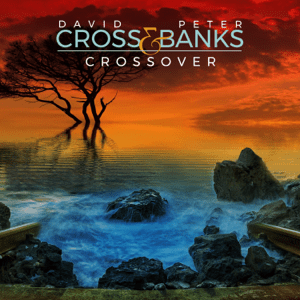 Are you satisfied with the response you got so far from fans and media for “Crossover” album with Peter Banks?
Are you satisfied with the response you got so far from fans and media for “Crossover” album with Peter Banks?
I am happy with any response. It’s good to people to acknowledge what you do. Yes, it’s been quite a big response and very positive, too. Most of it, has been very positive. So yes, I’m very pleased.
You recorded “Crossover” with Peter Banks on 10 August 2010. What was the musical intention that you and Peter Banks had that afternoon?
Our intention was just to improvise together.
Why did you decide to revisit the material of “Crossover” in 2018?
Because I thought it was worth it and Peter would have wanted me to try and make more out of it, from just naked to something more complete and more finished. I think he would have wanted that. It’s very sad that he can’t listen to it, because Peter is no longer with us. After that, I felt like trying to listen to that. Maybe I should try to build something from that. He gave me enough time after he said that he wanted to play, to make me feel comfortable. I wanted to do something with that and I think he would have wanted me to listen to it and see if it is worth it.
There are some great guests on “Crossover”. Why did you ask those particular musicians to play on the album and not others?
We asked people from King Crimson and Yes to play on the album. People that we knew. So, I asked people that I have met and I thought that they would be able to create something. Peter was a guitarist, so we wouldn’t need a guitarist, but we did want to use a bass, drums and other people we thought they would be interested in supporting the project. When I listened back to the recordings, I just felt that there have been elements of Yes and King Crimson that are coming through the improvisations. It became very elemental in our basic playing and it seemed integral to try to elaborate on that by bringing in guests from both sides and in the end the response was great. There are people from the Yes side and the King Crimson side, which is of course a band that I was in and Peter was very well noted by Yes musicians and fans alike. So, that’s what we did. We called people from those bands and whoever we called, was interested in contributing.
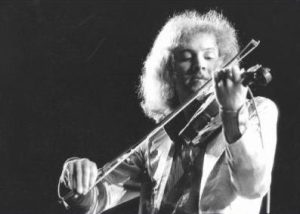 Tony Kaye’s (Yes, Badger, David Bowie, Circa -keyboards) Hammond parts are extremely beautiful. Would you like to do a full-length album with him?
Tony Kaye’s (Yes, Badger, David Bowie, Circa -keyboards) Hammond parts are extremely beautiful. Would you like to do a full-length album with him?
I haven’t met Tony Kaye, actually. There is a person who called him and asked him. He was invited by Daniel Earnshaw who represents The Peter Banks Musical Estate. He knew Tony Kaye and asked him to play on it and certainly he made absolutely fantastic contributions. Yes, I would be very pleased to play with anybody who contributed to this. They are all fantastic musicians and they all made this came alive with their performances. So yes, I would be very happy to play with everyone, including Tony Kaye.
“Crossover” is an instrumental album. Do you have trouble coming up with titles for instrumental tracks?
No, the names always suggested themselves to me while I’m writing. No, I have no problem. I enjoy creating crazy names. It’s funny really, because if they ‘ve got lyrics, then it’s very obvious. If they haven’t got lyrics, then it’s more interesting to create names for instrumental tracks. It’s a very interesting question really, because it doesn’t seem right if you look at classical music, for instance: They are often repeated and have very formal titles such as “Prelude and Fugue in C Major”, “Third Movement”, with all kinds of numbers and forms. I think it’s more interesting, instead of trying of come up with names derived from vocal standard tunes. I haven’t been asked that question before. It ‘s good to answer to your very interesting question. I think it does reveal about the way you think, the title you give to an instrumental piece.
It seems that you had a great time doing “Another Day” (2018) album with David Jackson (Van der Graaf Generator – saxophone). Did you enjoy that collaboration?
Yes, very much. It was a great time. We got on very well together from the day we first met. We had a lot of laughs, we cherished his sense of humour and ‘ve got very similar taste in music, quite a bold taste in music. We like beautiful tunes and avant-garde music, as well. You know, jazz and world. So, we had a lot in common. We had a really good time making that album. Yes indeed, fantastic.
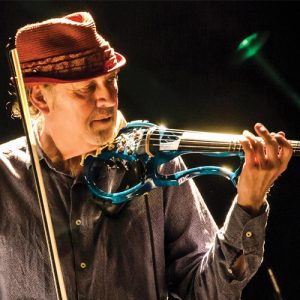 How important is improvisation to you?
How important is improvisation to you?
Very. It’s the time when I most feel myself. I find myself in mental places where I can’t get to, in any other way. So, it’s sometimes like a kind of meditation for me. It’s a way of travelling that I can’t be in any other way. So, it’s a very important part of my life. I miss it when I’m not doing it. It’s doesn’t mean that I can’t play on my own, but the joy of it is to do it with other musicians and an audience, as well. It’s really a key part of it. But I play into practice, with lots of practices; it’s not an easy thing to sustain. So, I need to practise improvising and I am practising on all the skills and I need to a do a violin improvising and violin technique and an electric violin technique in order to be my best self in improvising. Because I love the feeling and the space that I enter while I’m improvising and I ‘ll keep doing it. It’s almost addictive like a drug, really.
You have toured around the world with Stick Men (Tony Levin , Pat Mastelotto and Markus Reuter). What exactly does your violin add to their unique sound?
(Laughs) Yes, that’s a very good question, I think. I am not sure it does add anything, I think it’s just another one making the same kind of sounds. We all have a similar approach to making music in a live, with a lot of people that when they are involved in improvising, you are never sure who is playing what. So, there is a lot of empathy and a lot of understanding about what’s going on musically, which I really enjoy with that band and they are really fantastic to play with. What do I bring? I suppose I bring another element of heart and emotion to it. Maybe, I push things a bit further emotionally, maybe in a romantic way more than they would normally end up, I am not sure. I don’t really think of myself as kind of adding. My playing is much more like entering their space as myself. It’s a space where I’m very-very happy to be me, but I am conscious that is basically a space they ‘ve created and I love the musical space they have created. It’s as if to say: “Let me come in as a human being to share that space”. So, it’s a wonderful experience because in that space you meet these people, the other musicians as their musical selves, particularly because we did a lot of improvisations. It’s like meeting people on a different plane. It’s like seeing people’s spirit selves rather than their earthly selves. You are gonna be in the middle of that and then suddenly you realise you are on a stage and there is Tony Levin, Markus Reuter or Pat Matelotto and actually they all are as human beings. But it doesn’t feel like that when you are sharing musical space. It seems like you are flying through the air or going through the jungle or something else. So, it’s much more mysterious and interesting.
You worked again with Robert Fripp (King Crimson – guitar) on “Starless Starlight” (2015) album. What was the concept behind this album?
I have obsessions really about things and I have never been able somehow to let go of that old tune, the opening tune from “Starless” (ed: from King Crimson’s “Red” album – 1974). Robert had done some live improvisations around that theme as well and he offered them to me to use as soundscape to music as I recorded with. When I started doing that, I got more and more interested in how much could I do in terms of variety, in working from just that old tune outwards. So, the whole album is based around that tune that is just a few bars long but somehow we managed to produce an album. The starting point was Robert’s improvisations that he had been recording and then improvisations that I did with the compositional things that I did work and turning the tune upside down and things like that, trying to find ways of playing. Then, my buddy, Tony Lowe, who is the co-producer on this and did such a good work, just adding little bits here and there to make different sections, sounds, change the harmony and putting new textures. So, it was quite a big collaboration but it was really how much can you make out of this little musical statement and make it speak. How many different ways can you make out of that statement to speak and express itself. When I get these obsessions of little tunes and things like that, is because I believe they have a kind of life of their own, demanding to be more in the world than they have been. Great tunes definitely establish themselves in the world and to me that old tune needed to have a firm footing in the world. So, it was just bringing that to life.
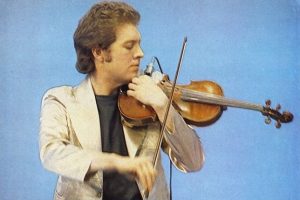 I am a big fan of your 1997 “Exiles” solo album, especially of the songs featuring Peter Hammill (Van der Graaf Generator -vocals), “Tonk” and “Troppo”. What does this album mean to you?
I am a big fan of your 1997 “Exiles” solo album, especially of the songs featuring Peter Hammill (Van der Graaf Generator -vocals), “Tonk” and “Troppo”. What does this album mean to you?
Well, again it was a similar theme really, it’s the “Exiles” theme (ed: from King Crimson’s “Larks’ Tongues in Aspic” – 1973) and it was a kind of unfinished business to do with the emotion of “Exiles”, that’s why we worked with that tune on that album. I had never worked with Peter Hammill, that was the first time I worked with him and I just wanted to see what he could do with some of my ideas and of course what he did was fantastic. You’ve got “Tonk” and “Troppo”, two of my favourite tracks from that album. That I suppose was more exploratory: It was kind of exploring backwards and exploring forward and exploring sideways. I had a fairly secure band of my own at the time and we were making good music together. I just wanted to see what reaching back and reaching sideways and maybe reaching forward would do; what kind of music we might be able to produce and certainly, Peter’s contributions were fantastic.
You are also the boss of Noisy Records. Does the business aspect distract you from creating more music?
Sometimes yes, particularly when it comes to doing the business side, the accounts and all those kinds of things. I think it is, in a way, a distraction. Luckily, my wife has been doing a lot of work on that. I mean, the reason I did it was because I wanted to have a vehicle for releasing my own music and I didn’t want to waste months talking to other record companies and trying to get them to release it. It’s always a difficult thing, you have to go to several companies and make sure you have the best deal and I have just got fed up with doing all that, in a way, although it works. At least, you know you are gonna be able to get the album out there. But it’s a bit of compromise. Now, I’m working quite well to have records released through the vehicle of a record company, coming out on Cherry Red. So, they are still on the Noisy label whereas I am able to get a bigger reach by going to a bigger record company. That’s a recent development and it works well for both of us, I think.
In my opinion, the King Crimson line-up from 1972 to 1974 is the best ever. When you recorded “Larks’ Tongues in Aspic” (1973) and “Starless and Bible Black” (1974), had you realized that your music was so ahead of its time?
No, I don’t think it was ahead of its time. It was on its time. I think other people were doing very extreme experiments in music at the same time. It was representative of hopefully some of the best ideas from around that time, which is the most interesting. Robert is a very innovative musician and Bill (ed: Bruford -drums) was always interested in musical development, self-development as a player, etc. John (ed: Wetton -bass) was always a rock star, but he just knew so much of the music, he felt so much about music and he was able to interpret things, in a rock way, which some other players wouldn’t be able to do at the time. He was very special, because he had lot of real intellectual and emotional insight to music that enabled him to pull things together that other people would never get on the some page. Robert had a lot of that, as well, but what John was able to do, was to give it a face that was readable, a kind of public face that people would be able to relate to it. Then, we had the wonderful Jamie Muir (ed: percussion, drums) who was an inspiration to all of us in the “Lark’s Tongues” period. He was very-very creative, a really big achiever, a great musician and Bill has learned a lot from him, I think. He was an inspiration to all of us.
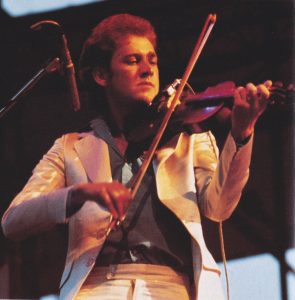 I really love “Exiles” from “Larks’ Tongues in Aspic”, which you co-wrote. Can you tell us a few words about that song?
I really love “Exiles” from “Larks’ Tongues in Aspic”, which you co-wrote. Can you tell us a few words about that song?
The beginning of it was when we met with and we did an improvisation, I think without John. John wasn’t there. We rehearsed in Covent Garden, just on the day we decided to go with King Crimson, that this band was going to be a new King Crimson. It was something I played “da-dadada-dadada”(ed: he sings the melody) in an improvisation there and I Robert picked up on it. He was interested and said: “Try that again! Try that again!” and he played a couple of chords along with it. That was the starting point of that. So, it was in the air and it came out of an improvisation. Then, the words started coming through; they came from Richard Palmer-James (ed: King Crimson lyricist). It was an emotion that I have always related to, because when I was growing up I always felt I was a bit of an exile, whatever company I was in, I was always in the wrong time and the wrong place. I don’t know really why that was, but I ceased to feel that way finally later, as I got older, but at that time, it always seemed to be a feature of my life, that I never quite belonged (laughs). I had been sent to a different place, just changing place but it wasn’t where I belonged and that haunted me; that emotion ended up into something I couldn’t work through it. I think this drove me do the “Exiles”, The David Cross Band album “Exiles” (1997), to work my ways through that feeling. In recent years, I felt that emotion at home and on stage, with musicians, with fans, in a way that I put music to it all. So, I wore that demon out of me. That fear is gone out of me, that insecurity. But it was a very strong feeling early in my life.
Your playing is fantastic on “Book of Saturday” (from “Larks’ Tongues in Aspic”)! Do you have any memories regarding this song?
That’s very kind of you, thank you. I really love the song. It’s very sweet and it was very precious to do in our set and I always wanted to try doing it justice. I made quite a sweet contribution and I think it was one the songs that I was pleased with my contribution overall and also John’s interpretation of that was tremendous. I thought: “That’s the kind of thing I want to play”. Yes, I was happy with that.
Is Robert Fripp an easy-going person to work with?
Oh fantastic, yeah! I learned so much from working with him about sounds, structures, about so much in music. Yes, he is fantastic. Certainly, when we were on the road together, he was delightful. On stage, he was always full of fun, playful, with good sense of humour… He was great and a great person to go through experiences, good and bad experiences: to go on stage frightened, to have a dinner with him in the city… It was a good thing. When you were nervous, it was good to see that he was there and he was pushing you to have a good performance. He was a very secure person to have around, really, to be there. An inspiration to me, certainly. Absolutely.
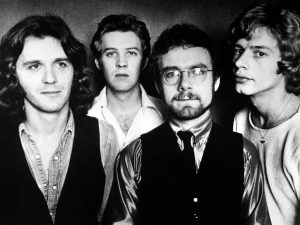 By the way, do you know the meaning of the lyrics that John Wetton (bass) used to sing live on “Easy Money”: “Cause they caught me licking fudge/ And they never told me once you were a minor”?
By the way, do you know the meaning of the lyrics that John Wetton (bass) used to sing live on “Easy Money”: “Cause they caught me licking fudge/ And they never told me once you were a minor”?
No, I just can’t remember what those lyrics were about. That’s on the album.
No. The live lyrics.
Yes. It’s on the original album. I thought that it was recorded.
No. No.
Well, that’s interesting. It must have gone out of my head. I totally missed it. It isn’t something I noticed as a big deal. I am sure, it sounds absolutely outrageous now, but I didn’t notice it at the time. I’m sorry, this is my ignorance. I didn’t know it was that important. I didn’t notice that something was going on with the lyrics. That was John’s area, really.
…Or Richard Palmer-James’. Anyway, was it an interesting experience to tour with Italian progressive rock legends Le Orme?
Yes, fantastic. They wanted a different thing from me than I usually do. They wanted me to play some beautiful tunes. It’s very hard for me, it’s not something that I do easily. I did my best with their music and it’s certainly an inspiration to play with. They are really comfortable people on stage and Michi (ed: Dei Rossi -drums) is fantastic. He is so good with the audience, such a good bandleader. Yes, it’s a really beautiful experience and you’ve got a lot to learn. I really enjoy it. They are pretty good musicians, they are great. They are a fantastic band. I would be playing with them again now, if it weren’t for the coronavirus. Yes, we are supposed to be playing now but it all fell through.
In 1993 you played on Jade Warrior’s “Distant Echoes” album. Were you familiar with their music?
No, I wasn’t familiar with their music. I was just invited in to do, but certainly I enjoyed it. It was a very nice experience. You know a lot (laughs).
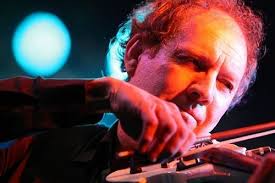 You have played with many musicians in your career. Is playing with different people a kind of evolution too?
You have played with many musicians in your career. Is playing with different people a kind of evolution too?
Yes, I think it is. It’s very important. It’s something I’ve learned to do. I mean, I wasn’t very confident, especially just after King Crimson, I was very underconfident about playing with anybody. I didn’t think anybody would want to play with me and I didn’t know if I would be able to. Gradually I started to play with other people and built a confidence about that. People had been very kind to me and then they showed me how to do things, both in recordings and live. I have friends who helped me play jazz, for instance. I would have never really been able to play jazz, but I had met a lot of people willing to teach me and help me understand that and that’s been fantastic. I find always people willing to help and they are all willing to help you grow, more than willing. I ‘d say: “If you have some idea, I ‘d love to join you in this or play on this album, but I ‘m not sure what you want from me. Can you teach me what it is to try to get up here?” They are very willing and most people willingly volunteer to help you with that and that is a wonderful growing experience. I just don’t want to stop doing that. It’s been an education that I went through and I’m desperate to learn more, because I’ll sit in my house for the next couple of months probably but then we can get out and start to do some playing with other people.
Do you think social media like Youtube and Facebook have helped younger listeners to learn about your music?
I truly think it’s a good way for me to get my music known. I’m very bad at using social media. I’m very bad at doing Facebook. It doesn’t seem too appropriate for me. I don’t seem to have a lot of people interested in what I want to say on Facebook, but at least the music is out there, so people would be able to listen to it. I do have a few really great supporters: fans, other musicians, journalists, DJ’s, whatever, who do play my music from time to time. Hopefully, my audience will continue to grow, I hope so, but I don’t think it’s because I am doing it very well on social media. It’s a good alternative. Especially now with the coronavirus and the way things are in society in our days. It’s essential.
Was there any kind of competition between you and Eddie Jobson (UK, Roxy Music, Curved Air – violin) in the ‘70s?
No, I don’t think so. I met him once in Virgin Records Management company. I said “Hi” to him then. I mean, I am not in competition with any other musician. I’m trying to communicate to an audience rather than being in competition with other players. My job is to do the best I can to communicate, to play music to the audience I am playing all the time. That’s all what I am concerned about. I’ll never get to be the best. I’m maybe the worst, I don’t know. It doesn’t interest me, really. What interests me is playing, that process of playing I enjoy.
Are you optimistic about the future of progressive rock?
Yeah, absolutely, because it’s progressive. It’s always been progressive and it’s looking moving forward in any direction. Forward is the future. So yeah, absolutely.
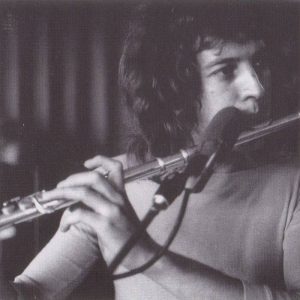 What’s next for David Cross?
What’s next for David Cross?
I’m working with The David Cross Band on a new studio album. The band is now four people; Mick Paul on bass, violin, Steve Roberts on drums and the singer Jinian Wilde. We are re-working some vintage material and we ‘ve written some new songs for this. The drums, bass and vocals have been recorded and I am just creating the violin parts.
Do you miss John Wetton?
I miss him terribly, yeah. I’m really sorry that he’s not in the world anymore. I didn’t see him much after Crimson but we did some work together on “Exiles” (ed: David Cross album – 1997). Then, I remember meeting him when he did a festival in Rome and we were guests for different bands, but I had a nice long chat with him then and that was really sweet. It was nice to talk with him. Yes, I do miss him. When I practise “Exiles”, it has always been our version with John singing and it’s like he is in the room with me when I’m doing that. So, that’s lovely and I’ll love him forever. I think it’s a great loss and it’s very sad that he died so young.
A huge “THANK YOU” to Mr. David Cross for his time and to Billy James for his valuable help.
Official David Cross Band website: https://www.davidcrossband.com/
Official David Cross Facebook profile: https://www.facebook.com/david.cross.33821
Official David Cross Music Facebook page: https://www.facebook.com/David-Cross-Music-105639052830314


